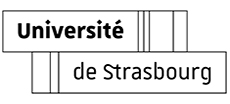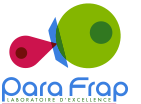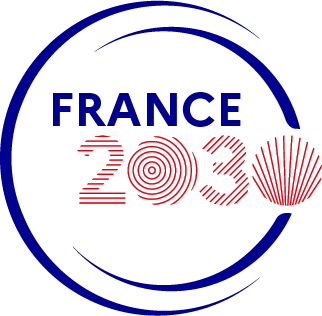-
PARAFRAP
- Qui sommes-nous
- Objectifs du Labex
- Laboratoires de recherches
- Coordinateurs
- Collaborateurs industriels
- Tutelles et soutiens
- GOUVERNANCE
- Organisation
- Comité de pilotage
- Comité exécutif
- Conseil scientifique international
- Comité Institutionnel
- FORMATION
- CONFERENCES
- THÉMATIQUES
- Exploitation des données post génomiques
- Mécanisme de la pathogénie
- Biologie Cellulaire et Moléculaire
- Nouvelles stratégies d'interventions thérapeutiques
- Plateformes
- VALORISATION
-
PARAFRAP
- Qui sommes-nous
- Objectifs du Labex
- Laboratoires de recherches
- Coordinateurs
- Collaborateurs industriels
- Tutelles et soutiens
- GOUVERNANCE
- Organisation
- Comité de pilotage
- Comité exécutif
- Conseil scientifique international
- Comité Institutionnel
- FORMATION
PostDoc l Biological Chemistry l Strasbourg


PostDoc position in Biological Chemistry/Biochemistry/Proteomics at University of Strasbourg, France
A renewable 6 month post-doctoral position is open at the ECPM (University of Strasbourg) to use activity-based protein profiling (ABPP)-based probes to evaluate the metabolism of the antiplasmodial drug plasmodione & derivatives, and to fish drug targets in living cells (E. coli, S, cerevisiae, P. falciparum). To circumvent the enhanced transmission of drug resistant malaria parasites to mosquitoes the team of the coordinator has developed an optimized plasmodione analogue with potent anti-gametocyte V and transmission-blocking properties. The postdoc project will use photoreactive plasmodione-derived alkynes as partners of the click reaction to fish and reveal target-protein adducts in mature P. falciparum rings and gametocytes upon irradiation and analyze them by mass spectrometry in chemical proteomics studies.
Project leader:
The project will be supervised by Dr. Elisabeth Davioud-Charvet, and integrated within a French/Swiss consortium working on novel antimalarial drugs and encompassing multiple disciplines: biological chemistry of redox-active antiparasitic compounds (Dr. Elisabeth Davioud-Charvet at LIMA-Strasbourg, & Marjorie Schmitt at LIMA-Mulhouse, UMR7042), mass spectrometry analysis & proteomics (Dr. Christine Schaeffer & Jean-Marc Strub) at IPHC, LSMBO, Strasbourg, Dr. Sarah Cianferani)), the biology of mosquitoes and malarial parasites (Dr Stephanie Blandin, MIR/M3I, IBMC, Strasbourg), and parasitology and drug screening (Prof. Pascal Maeser, University of Basel, Switzerland).
Project:
For the ROSkillers project, new selective activity-based probes were designed for the identification of plasmodione protein targets. A first proof-of-concept has been reported in vitro (Cichocki B. et al., JACSAu 2021, 1(5):669-689. doi: 10.1021/jacsau.1c00025). The postdoctoral researcher will undertake the analysis of the global interactome of this promising agent in vivo, first in E. coli and/or S. cerevisae overexpressing flavoenzymes as models, and then in parasite asexual stages and in gametocytes using proteomics methodologies. Candidate targets will be then validated with genetic engineering in Plasmodium. .
Activities and experience:
We are looking for a highly motivated and ambitious candidate with a strong background in mass spectrometry analysis of proteins (fundamental criteria). Additional expertise in click chemistry and/or photoirradiation would be appreciated. The ideal candidate will have a proven track record of scientific excellence, very good communication and writing skills as well as a strong commitment to experimental work. The candidate should be also able to perform independent research and be eager to engage in collaborations with co-workers within this project. Knowledge of the French language is not required. Thorough knowledge of English, both oral and written is mandatory..
Application:
Application deadline : 30/04/2022
Application e-mail : christine.schaeffer (at) unistra.fr, sblandin (at) unistra.fr , elisabeth.davioud (at) unistra.fr
mardi 16 avril 2024Seminar - Boris Striepen - May 24
The York Biomedical Research Institute (YBRI) are hosting an online live seminar on Friday 24th May 1-2pm BST as part of their biomedical science seminar series. You are all welcome to attend - registration is required via the...
vendredi 12 avril 2024Arthur Talman a reçu une ERC Advanced grant
[Communiqué] Félicitations à Arthur Talman, chargé de recherche IRD dans le laboratoire MIVEGEC (Montpellier), qui a obtenu une subvention "Advanced Grant" du Conseil européen de la recherche (ERC) pour le projet "TROJAN -...
mercredi 13 mars 2024Médaille de Bronze du CNRS pour Ana Rita GOMES
Ana Rita Gomes, chargée de recherche CNRS au Laboratoire des Pathogènes et de l'Immunité de l'Hôte à Montpellier, et ancienne Postdoc du LabEx ParaFrap, a été récompensée par la prestigieuse Médaille de Bronze...
lundi 11 mars 2024Offre de thèse l Cryptosporidium l Tours
. Offre de thèse, Tours, France Encadrement Encadrement de la thèse : Sonia LAMANDE ; Co-Encadrante : Julie TOTTEY Projet: CARACTÉRISATION FONCTIONNELLE DE CATHEPSINES À CYSTÉINE CHEZ LE PARASITE APICOMPLEXE...
mardi 6 février 2024PostDoc l Computational Biologist l Paris, France
Senior PostDoc position : computational biologist, Paris, France The ParSig team (https://research.pasteur.fr/en/team/molecular-parasitology-and-signaling) at the Institut Pasteur in Paris seeks for a highly...
lundi 22 janvier 2024Chercheur.se l Immunologie l Montpellier, France
Chercheur.se en immunologie des animaux de rente dans les trypanosomoses animales Via une approche One Health, l'unité mixte de recherche Intertryp (Cirad-IRD) développe des recherches sur les interactions...
dimanche 7 janvier 2024Webinaires 2024
Bonnes années 2024 ! Pour bien commencer cette nouvelle année scientifique, voici le programme des webinaires ParaFrap. Depuis Janvier 2021, ParaFrap organise une série de webinaires. Ce rendez-vous mensuel, organisé tous les 2ème jeudi du...
mercredi 20 décembre 2023PostDoc l Plasmodium l Allschwil, Switzerland
PostDoc position : functional analysis of P. falciparum early gametocyte proteins, Allschwil, Switzerland The Malaria Gene Regulation Lab of Till Voss is looking for a highly motivated and talented postdoc to...
mercredi 13 décembre 2023Nouvelle méthode pour produire in vitro des pré-gamètes de Toxoplasma
L'équipe du Dr. Mohamed-Ali Hakimi, en collaboration avec Isabelle Coppens (Johns Hopkins University Bloomberg School of Public Health and Malaria Research Institute, Baltimore, MD, USA), a développé une nouvelle méthode (épi)génétique...
vendredi 6 octobre 2023Success for ParaFrap at MPM2023
Success for ParaFrap students at MPM2023 Parafrap students won numerous awards at the MPM 2023, Woods Hole USA, 17-21 September 2023. A warm congratulations to all ! Parul Sharma (2nd year PhD under the...
PROGRAMME DE FORMATION FR
Programme Doctoral InternationalProgramme Post-doctoralACTUALITÉS
Actualités du LabEx
Autres actualitésCONTACT
Project Manager: Yoann MILLERIOUX
Contact
@ParaFrap #ParaFrap © 2023. Tous droits réservés by MLCOM
Notre site LabEx ParaFrap utilise des cookies pour réaliser des statistiques de visites, partager des contenus sur les réseaux sociaux et améliorer votre expérience. En refusant les cookies, certains services seront amenés à ne pas fonctionner correctement. Nous conservons votre choix pendant 30 jours. Vous pouvez changer d'avis en cliquant sur le bouton 'Cookies' en bas à gauche de chaque page de notre site. En savoir plus
Paramétrages de cookies
×Cookies fonctionnels
Ce site utilise des cookies pour assurer son bon fonctionnement et ne peuvent pas être désactivés de nos systèmes. Nous ne les utilisons pas à des fins publicitaires. Si ces cookies sont bloqués, certaines parties du site ne pourront pas fonctionner.
Mesure d'audience
Ce site utilise des cookies de mesure et d’analyse d’audience, tels que Google Analytics et Google Ads, afin d’évaluer et d’améliorer notre site internet.
- Google Analytics
- Google Ads
Contenus interactifs
Ce site utilise des composants tiers, tels que NotAllowedScript6623ed5bcc635ReCAPTCHA, Google NotAllowedScript6623ed5bcc1aeMaps, MailChimp ou Calameo, qui peuvent déposer des cookies sur votre machine. Si vous décider de bloquer un composant, le contenu ne s’affichera pas
- Google Maps
Pour en savoir plus, cliquez sur le lien.
Voir le site officiel - Calameo
Pour en savoir plus, cliquez sur le lien.
Voir le site officiel - reCaptcha V2
Pour en savoir plus, cliquez sur le lien.
Voir le site officiel - reCaptcha V3
Pour en savoir plus, cliquez sur le lien.
Voir le site officiel
Réseaux sociaux/Vidéos
Des plug-ins de réseaux sociaux et de vidéos, qui exploitent des cookies, sont présents sur ce site web. Ils permettent d’améliorer la convivialité et la promotion du site grâce à différentes interactions sociales.
- Twitter
Pour en savoir plus, cliquez sur le lien.
Voir le site officiel
Session
Veuillez vous connecter pour voir vos activités!Autres cookies
Ce site web utilise un certain nombre de cookies pour gérer, par exemple, les sessions utilisateurs.




